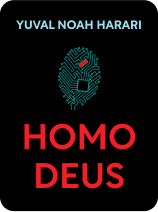

This article is an excerpt from the Shortform book guide to "Homo Deus" by Yuval Noah Harari. Shortform has the world's best summaries and analyses of books you should be reading.
Like this article? Sign up for a free trial here .
What is techno-religion? How did the rise of techno-religion threaten to knock down the very ideals that gave birth to the phenomenon?
Techno-religion is a humanist ideology in which technology—not God or other theistic concepts—is used as a means for satisfying the human quest for meaning and spiritual salvation. Techno-religions can be divided into two categories: transhumanism and dataism. Interestingly, both threaten to knock down the very ideological bedrock on which they stand.
Keep reading to learn about the two types of techno-religion: transhumanism and dataism.
What Is Techno-Religion?
Techno-religion promises the guidance and salvation of traditional religions but uses technology to generate happiness instead of celestial beings.
Techno-religions can be divided into two categories:
- Techno-humanism: The belief that Homo sapiens should use technology to create Homo deus, ensuring that humanity maintains superiority on Earth.
- Dataism: The belief that Homo sapiens have run their course and should pass superiority on to advanced algorithms.
Techno-Humanism
Techno-humanism maintains many traditional humanistic beliefs but accepts that Homo sapiens have no place in the future. Because of the rate of advancement with artificial intelligence, techno-humanists believe that humanity must focus on upgrading the human mind if it wishes to compete with advanced external algorithms.
Over 70,000 years ago, the Cognitive Revolution caused minor shifts in the minds of Homo sapiens, transforming them from African apes into the dominant force on the planet. Techno-humanists believe another transformation is due, this time using technology to make adjustments.
The techno-humanist perspective is most closely related to the evolutionary humanists of the 20th century. However, where evolutionary humanists such as Hitler believed the superior human could only emerge through the use of selective breeding and the eradication of “inferior” beings, techno-humanists strive to achieve the next phase of evolution peacefully, using genetic engineering, human-computer integration, and nanotechnology.
Because techno-humanism is a humanist movement, it emphasizes the importance of human desire. According to techno-humanists, the areas of the brain that humanity will upgrade will be determined by individual human desire, or the “inner self.”
However, technological progress intends to control human desire, not listen to it. For example, if researchers discover a way to easily regulate chemical imbalances in the brain, they could find a way to “turn off” mental issues such as depression and anxiety. However, if this technology fell into malicious hands, someone—or something—could hypothetically create an obedient (but happy) populace.
Human beings have already started to manipulate the brain in this way, using pharmaceuticals to change its chemical makeup. For example, if a successful businesswoman feels “distracted” by feelings about starting a family, doctors can give her Ritalin to help her focus and shut out the “unwanted” thoughts. While the woman may make the initial decision to start the drug, her decisions while on the drug will be influenced by the new chemical balance in her brain.
This leads to a series of questions that may threaten the humanist aspect of the techno-humanist agenda:
Question #1: Does the “inner self” actually exist, or is it simply the result of electro-chemical reactions?
If the concept of the “inner self” dies, humanism dies, killing the techno-humanist movement in the process. For example, a person may believe that their “inner voice” is telling them to quit their job because they’re unhappy. They do so and move to a different job, only to find that they’re still unhappy. In reality, the chemicals in their brain are unbalanced, causing severe depression. Did the person leave the job because they listened to their “inner voice” or because of the chemicals in their brain?
Question #2: If there is an “inner voice,” how does it differentiate between “good” and “bad” feelings?
How do human beings determine which traits to amplify and which to silence? Some “unpleasant” feelings are necessary for survival while some “pleasant” feelings are dangerous when left unchecked. For example, a devout Christan man who’s struggling with his sexuality may believe that being gay is a “bad” feeling. If the technology exists, he may go to the doctor to be “cured” of his homosexual feelings. However, if the doctor happens to be a very attractive man, he may ask the doctor to make it so he never feels the urge to be straight again. In this situation, which of his requests came from his “inner voice”? Did he succumb to temptation in the moment or was he overcoming theistic brainwashing?
Question #3: What happens when technology advances to the point that it can shape human desire on its own?
If advanced algorithms manipulate the feelings and desires of humans, who’s actually making the decisions on what areas of the brain should be upgraded, and what areas can be left to wither away? For example, if an AI controls a chemical regulator in your brain, the AI may choose to make you feel satisfied all of the time, killing your ambition in the process. Even if you had control over the chemical balance via an app or online system, you would never be tempted to change the settings because you’d live in a constant state of euphoria. Who, then, is shaping your innermost desires and wants? You or the AI?
Dataism
While some cling to the ideals of humanism, others have turned to a more extreme version of techno-religion: Dataism. Dataism operates under the belief that the universe is connected by the flow of data and that the value of anything, human or otherwise, can be determined by its ability to process data.
Dataism negates the core values of humanism, valuing raw data over human experience. Rather than lifting humanity over all other beings, Dataism connects all animals and breaks down the barrier between organic and inorganic entities.
By focusing solely on statistical information, Dataists believe they can connect everything from music to economics using data patterns, creating a common language that everyone can relate to . For example, while Bach’s St. Matthew Passion, the DOW-Jones, and the mating patterns of cows seem unrelated, Dataists view them as data flows that can be analyzed using data concepts and tools.
Dataism inverts the traditional system of learning. According to current methods, humans are supposed to transform data into information, information into knowledge, then knowledge into wisdom. However, Dataists suggest that humans don’t have the capacity to decipher the growing amount of information in the modern era. Therefore, humans should leave the processing to external algorithms with stronger processing power while contributing data to the process.
Modern science has started to merge biology with concepts of Dataism, looking at both individual organisms and entire communities as data processing units. For example, a beehive can be broken down into statistical patterns, with every bee introducing new data to the equation and executing determined patterns.

———End of Preview———
Like what you just read? Read the rest of the world's best book summary and analysis of Yuval Noah Harari's "Homo Deus" at Shortform .
Here's what you'll find in our full Homo Deus summary :
- Why technology is replacing humanist ideals
- How previous generations relied on prayer to deal with serious problems
- How AI and algorithms are going to run the world






